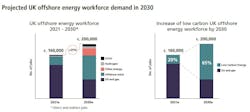Report highlights changing roles in Britain’s offshore market
Offshore staff
ABERDEEN, UK – Robert Gordon University (RGU) expects marked changes in the UK’s offshore energy workforce mix over the next decade.
RGU’s UK Offshore Energy Workforce Transferability Review predicts that roles in decarbonized energies will rise from 20% to 65% of all jobs in Britain’s offshore energy market (oil and gas, offshore wind, carbon capture utilization and storage, and hydrogen).
More than 90% of the UK’s oil and gas workforce appear to have a medium to high skills transferability and are therefore well placed to work in other energy sectors.
Investments in capital and operating activities in the UK offshore energy market over the next 10 years could total over £170 billion ($241 billion).
Key findings of the review include:
- Around 80% of the jobs in 2030 could be taken up by operations, technicians, engineering, projects, commercial/business development/marketing, procurement/supply chain management, finance, HR and HSE.
- Around 100,000 (c 50%) of the jobs in 2030 could be taken by people transferring from existing oil and gas jobs to offshore renewable roles, plus new graduates and new recruits from outside the existing UK offshore energy sector.
- Around 200,000 people will likely be needed in 2030 to support developments in offshore wind, hydrogen, carbon capture and storage alongside ongoing UK offshore oil and gas activities. This compares to around 160,000 people directly and indirectly employed in the UK offshore energy market in 2021.
- Of the 200,000, around 45% will be supporting offshore wind, 35% oil and gas, and 20% other offshore-related energy projects and clusters.
05/25/2021
